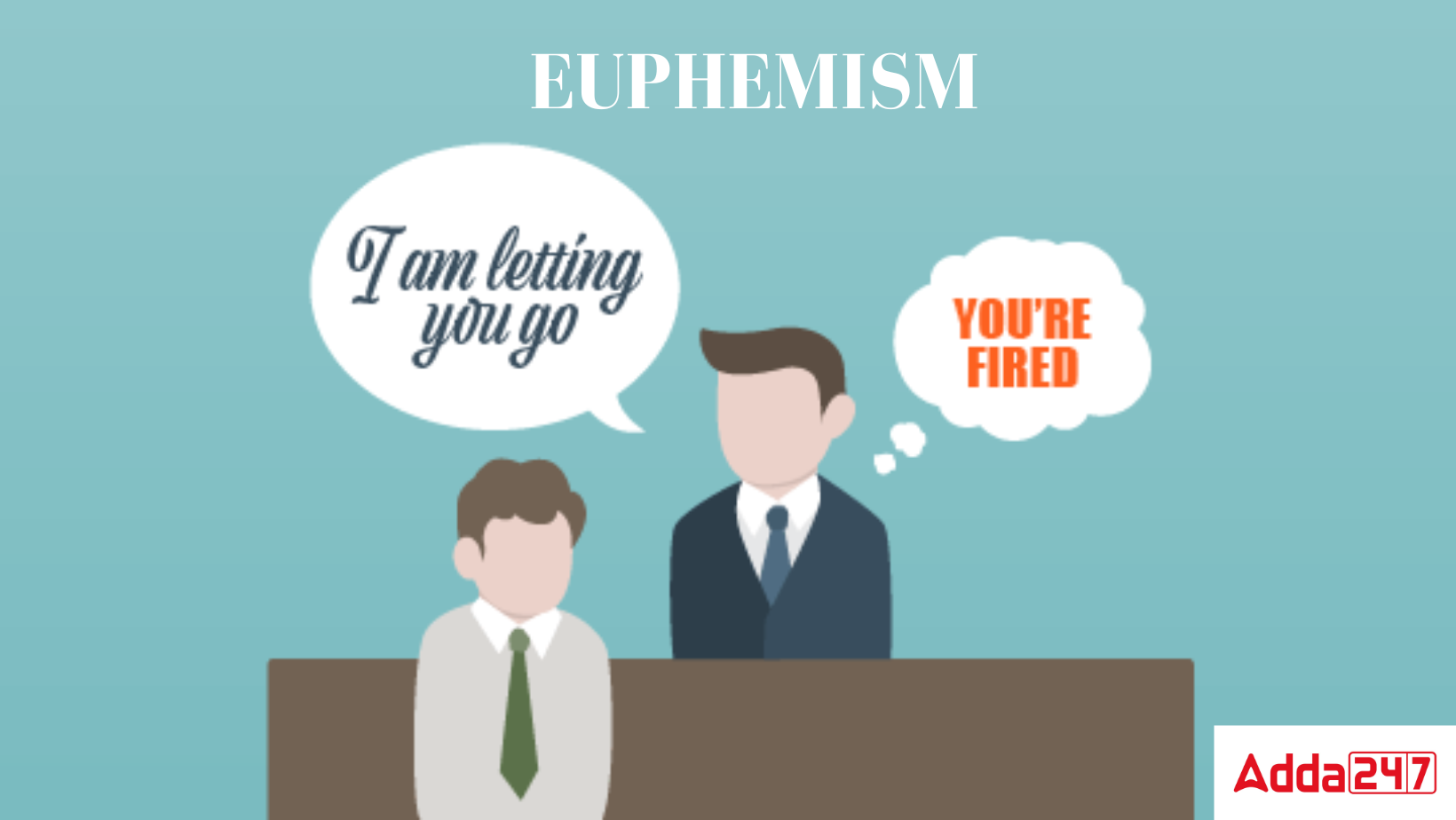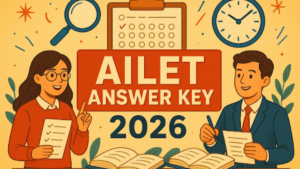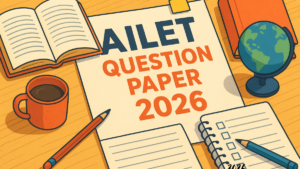Euphemism Meaning in English
When unpleasant or rude words are replaced with pleasing or neutral ones, this is known as a euphemism.
Euphemisms are frequently employed to minimise the effect of unwelcome news or to facilitate tough conversations. In politics, business, and difficult conversations, they are frequently employed (e.g., discussions about death or sex).
Euphemism Meaning and Definition
Euphemisms are words or phrases that can be used to convey unpleasant, depressing, or prohibited information. It is the art of saying things in a way that is less obnoxious, lighter, or in a more subtle way.
You may be able to better grasp the term euphemism by looking at how different dictionaries define it. Euphemisms are described as “an indirect word or phrase that people frequently use to refer to something uncomfortable or unpleasant, sometimes to make it appear more acceptable than it actually is” in the Oxford Learner’s Dictionary. Euphemism is defined as “a term or phrase used to avoid speaking an unpleasant or insulting word” by the Cambridge Dictionary.
According to the Merriam-Webster Dictionary, euphemism is defined as “the substitution of an agreeable or inoffensive expression for one that may offend or suggest something unpleasant.” The Collins Dictionary defines euphemism as “a polite word or expression that is used to refer to things which people may find upsetting or embarrassing to talk about.”
How to use Euphemism in sentences?
It’s usually helpful to have multiple ways to convey any given piece of information. Nobody is ever forced to deal with only good things. There will occasionally be terrible incidents and undesirable thoughts to discuss. You should develop the ability to present even awful ideas in a pleasant and acceptable way. You should also become familiar with euphemisms because they make you sound more worried about other people or recent events. When employing euphemisms, it’s essential to keep in mind that they’re not meant to be ironic. Before using any euphemism in your writing, you should also make it a point to comprehend what it implies.
Euphemism Examples
Here are a few instances of sentences that make use of euphemisms. Examine them and make an effort to understand their purpose.
- His great-grandfather passed away last week.
- It is so unfortunate that we have to let you go.
- Sandra seems to be between jobs.
- The collateral damage that resulted from the war was saddening.
- We have a differently-abled man working as security.
- We got to know that the family was on the streets, and so we are trying to help them in every way possible.
- Shankar belongs to a well-to-do family.
- The company has been facing negative cash flow for the past few years.
- Devan’s grandmother seems to be enjoying her golden years happily and peacefully.
- Rory was planning to go over to her parent’s house to break the news of the bun in the oven.
Euphemism Examples Sentences
For your reference, the most common euphemisms examples sentences used in everyday conversation are included in the following table along with their definitions. Look into it.
| Euphemism | Meaning | Euphemism | Meaning |
| Well-to-do | Rich | Well-off | Rich |
| On the streets | Homeless | Between jobs | Unemployed |
| Bun in the oven | Pregnant | Negative cash flow | Having debts |
| Golden years | Old age | Differently-abled | Not possessing normal physical, mental and psychological abilities |
| Let one go | To fire someone | Big-boned | Fat or large |
| Curvy | Fat | Well-fed | Overweight |
| Pre-owned | Used by someone else | Lay off | To fire someone |
| Hearing-impaired | Used to refer to someone who is completely or partially deaf | Speech-impaired | Used to refer to someone who has speech-related issues |
| Telling stories | Refers to the act of lying | Tell tales | Refers to the act of gossiping or speaking about another person’s actions. |
| Lose your lunch | Vomit | Pass away | To die |
| Collateral damage | Refers to the damage done as a result of war, including deaths and injuries | Not the sharpest pencil in the box | Refer to the quality of being stupid |
| Lost one’s marbles | To refer to someone who is diagnosed/suffering from mental illness | Physically challenged | Used to refer to someone who is handicapped |
| Mentally challenged | Used to refer to someone who is partially or completely mentally abnormal | Over the hill | Used to refer to someone who is old |
| Armed intervention | Refers to a military attack | Lost someone | Used to refer to someone’s death |
| Put to sleep | Euthanise/Refers to the act of mercy killing | A bit under the weather | Used to imply that someone is sick |
| Couch potato | Used to refer to someone who is lazy | Late bloomer | Used to refer to someone who takes time to understand and learn |
| Running a little behind | To refer to being late | Outspoken | Used to refer to someone who is bossy and controlling |
| Overzealous | To refer to someone who is aggressive | Donning the fedora | Stepping out of one’s comfort zone as far as fashion is concerned |
| Adult beverages | Used to refer to liquor | Underprivileged | To refer to people who are poor |
| High-rolling | Used to refer to someone who spends money lavishly and thoughtlessly / a spendthrift | Down-and-out | Used to refer to a person who is completely out of money, has no job or a place to stay |
| A little thin on top | Used to refer to someone who is bald or going bald | To be in the bread lines | Used to refer to people who are so poor that they have to depend on food donations to survive |
| Whips and jungles | Refers to nervousness and depression | A bit down in the dumps | Used to refer to the state of being unhappy or depressed |
| To get off the deep end | Used to refer to an emotional outburst, mostly due to anger, resulting in extremely strange behaviour | Blow a fuse | Used to refer to the action of losing one’s temper |
| To blow a gasket | To become very angry | Visually impaired | Used to refer to someone who is partially or completely blind |
Euphemism Meaning FAQs
Que. What do you mean by Euphemism?
Ans. Euphemisms are words or phrases that can be used to convey unpleasant, depressing or prohibited information. It is the art of saying things in a way that is a less harsh, lighter, or more subtle way.
Que. Why should we use Euphemisms?
Ans. The basic purpose of euphemism is to make something appear or sound less difficult or unpleasant than it actually is. It can be utilised to convey to your audience your sincere concern for the subject at hand.
Que. What are some examples of Euphemism?
Ans. Some examples of Euphemisms are given below
- His great-grandfather passed away last week.
- It is so unfortunate that we have to let you go.
- Sandra seems to be between jobs.
- The collateral damage that resulted from the war was saddening.
Que. Is euphemism an offensive word?
Ans. The Collins Dictionary defines euphemism as “a polite word or expression that is used to refer to things which people may find upsetting or embarrassing to talk about.”
Que. What does euphemistic mean?
Ans. Euphemistic means to use a word or phrase in order to avoid paying a more unpleasant or offensive word.









 AILET Answer Key 2026 , Download Provisi...
AILET Answer Key 2026 , Download Provisi...
 AILET Question Paper 2026 with Solution,...
AILET Question Paper 2026 with Solution,...
 UP NEET Counselling 2025 Round 5 Merit L...
UP NEET Counselling 2025 Round 5 Merit L...














